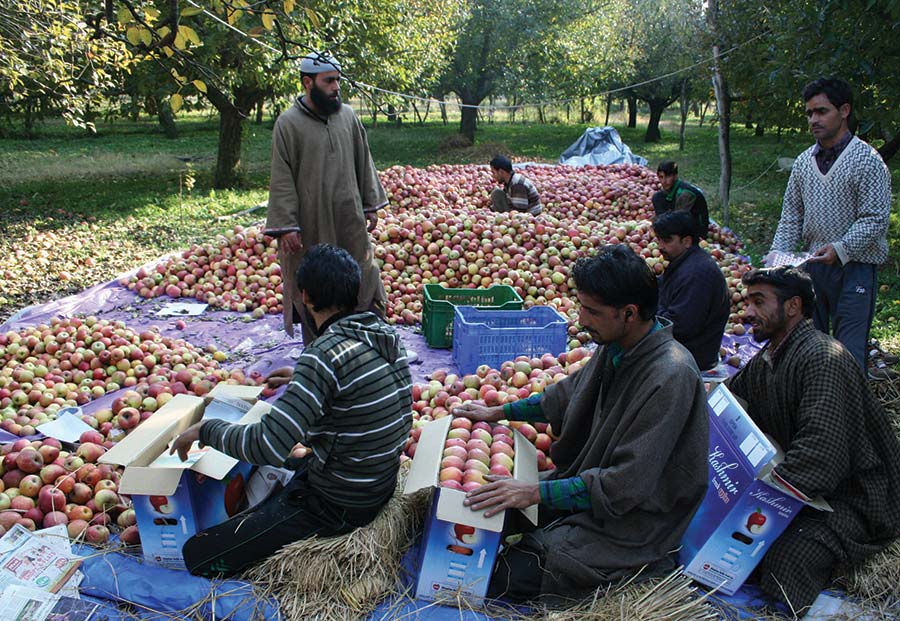by Syed Suhail Yaqoob
The only visible component in these orchards is money. Not only these orchards have destroyed the social and cultural life of villages but also taken away from women their participatory role in economic development. Every significant operation in apple orchards is carried out by men and machines. Women are completely side-lined
 In the early nineties, most of our fertile land was monopolized by rice production. Its entire production process, especially sowing and harvesting, was full of captivating events.
In the early nineties, most of our fertile land was monopolized by rice production. Its entire production process, especially sowing and harvesting, was full of captivating events.
Almost the entire village especially women were involved in Wanwun, the traditional songs of Kashmir. These songs used to be about the stories of our past history, the stories of hard work, and the oppression of women and these were full of satire.
Although these were times of drudging work for young people, they provided children below 14 years a good opportunity to bunk schools. After rice harvesting, the leftover was collected at a place in rice fields locally known as Goneh. These helped us to play an important game known as Eis-pise. It was very difficult to find someone around these structures.
Moreover, these rice fields were full of grasshoppers and we used to catch them for play. Children used to call them Helicopters. These rice fields were also full of opportunities to know our culture and our past, present and stories of hard-working people.
A village was sustainable and completely independent for its survival. Farmers, however, were dependent on each other which fomented community development and corporation. These rice fields also typically depended on women’s work which provide them an opportunity to vent their anger against patriarchy in Kashmir. No doubt Kashmir has seen some tragic famines in the past, but overall this kind of life was environmentally friendly and socially sustainable.
A Change
As of now, South Kashmir has completely dedicated its land to horticulture production, especially apple production. It brings crores of rupees to farmers which has led to an increase in per-capita income, lifestyle changes and a shift in the standard of living. Horticulture is the major sector which plays a key role in Kashmir economy. It generates approximately Rs 10,000 crore annually income and contributes 8 percent to Gross State Domestic Product (GSDP).
As per the government figures, 7.5 lakh families/35 lakh population are involved in this sector. It is the main employment generation sector (each hectare of orchard generates 400 man-days per year of employment. The emerging/growing sector has ample opportunities for agro-industries/employment. An area of 3.33 lakh hectares (2020-21) is under fruit cultivation. A production of 20.35 lakh MTs (2020-21) has been recorded in the previous year. This sector can transform the economy of UT tremendously over the next decade by creating job opportunities, increasing production to maximum economic growth, ecological development, and poverty alleviation.
Although this sector has helped in the progress of our countryside, but it has some fatal consequences. The boys of the nineties can relate to these consequences. We have seen the powerful impact of neo-liberalism creeping slowly and steadily into the village life destroying every bit of autonomous village life. The first impact of neo-liberalism is to destroy localised culture and imbibe it with a structure that is very entrenched and interdependent.
As of now, Kashmir’s periphery, mostly South Kashmir, is relentlessly under the impact of a sort of neo-liberalism. The powerful impact has messed with its fine social structure and replaced rice with apple production.
Economists might provide reasonable support in favour of apple production rather than rice production, but the havoc on social and cultural life cannot be side-lined. We see no Wanwun in those orchards, no Ladi Shah, no social dependence and no composite village culture. As of now, average land has declined to marginal levels implying no dependence on other families. These orchards have taken over by aggressive machinery which requires less human and creative effort compared to rice cultivation. Owing to aggressive machine usage, these orchards lack fine cultural propagative power.
The only visible component in these orchards is money. Not only these orchards have destroyed the social and cultural life of villages but also taken away from women their participatory role in economic development. Every significant operation in apple orchards is carried out by men and machines. Women are completely side-lined. Apple orchards are patriarchal where men are favoured rather than women, simply because of their muscle power.
Besides, these apple orchards are dominated by fungicides and pesticides that have created havoc on the bio-diversity in the area. Very little insect life is found around these fields now as farmers resort to huge and unsustainable spraying. We can hardly save these harmful pesticides and fungicides going into the river system. In rice fields, all kinds of bio-diversity were found from frogs to grass-hoppers.

As young and grown-up boys in both economic systems, we may cherish more economic power, however, it has not to be at the cost of live-cultural life. Rice fields provided our villages with less economic power it helped to develop our language and provided good opportunities for cooperation and sustainable life. An ordinary look at the structure of apple orchards reveals their stony character devoid of life compared to rice fields. These orchards are not only masculine but very oppressive to our social culture.
(The author is PhD in economics from Aligarh Muslim University. The opinions expressed in this write-up are those of the author’s and do not purport to reflect the views of Kashmir Life.)















